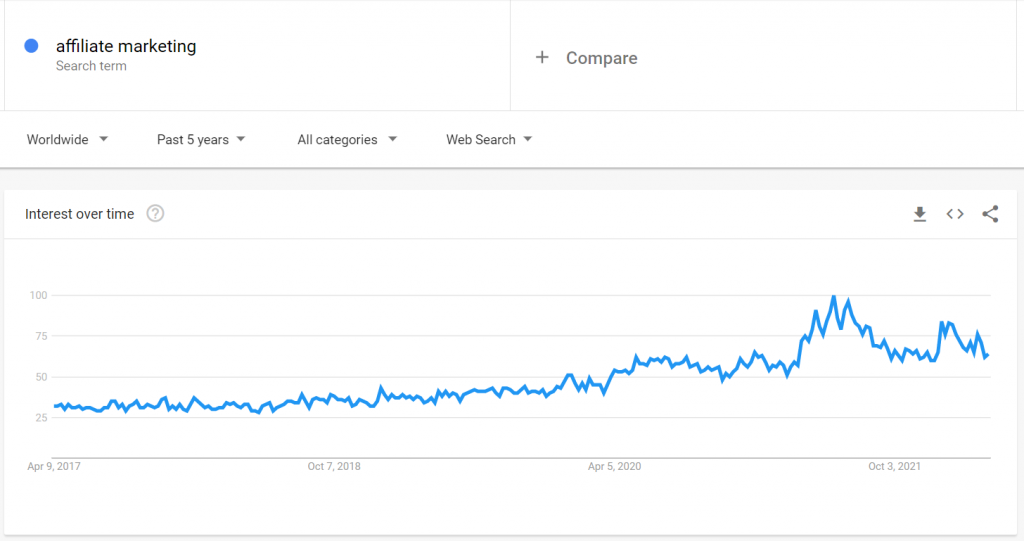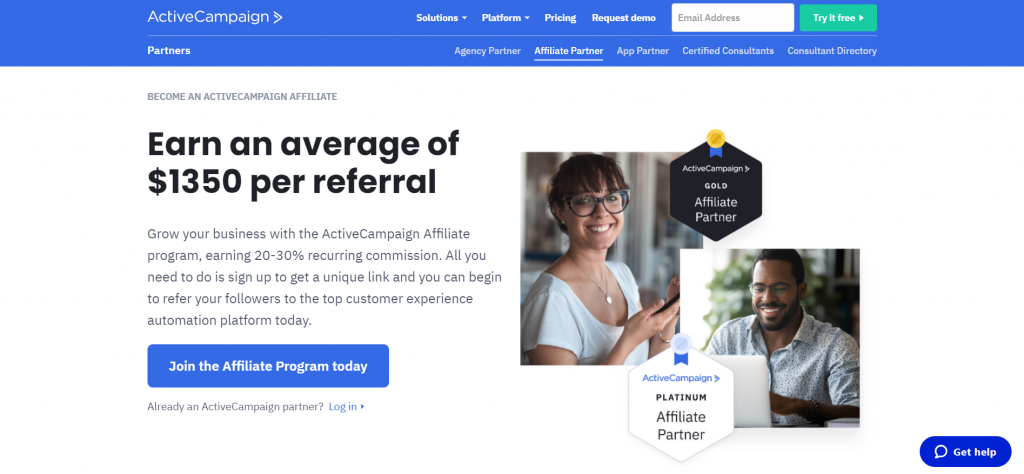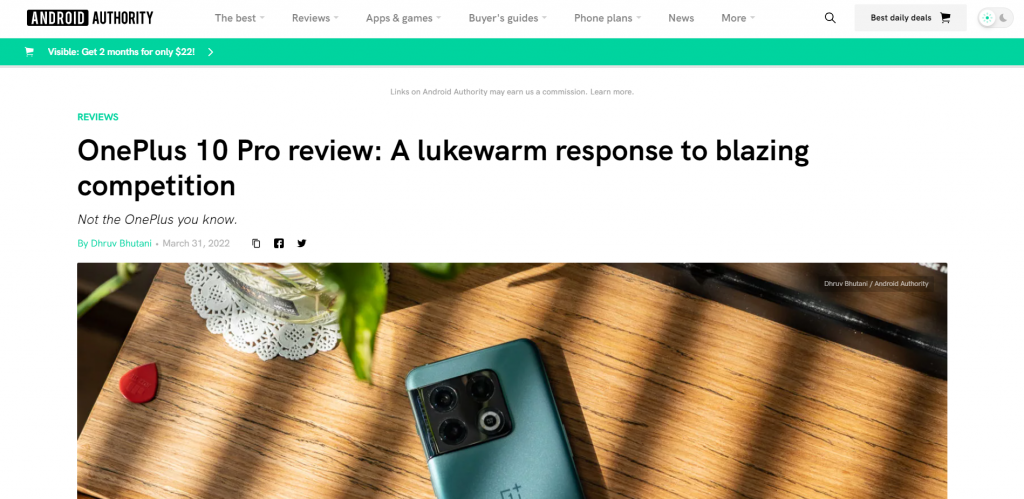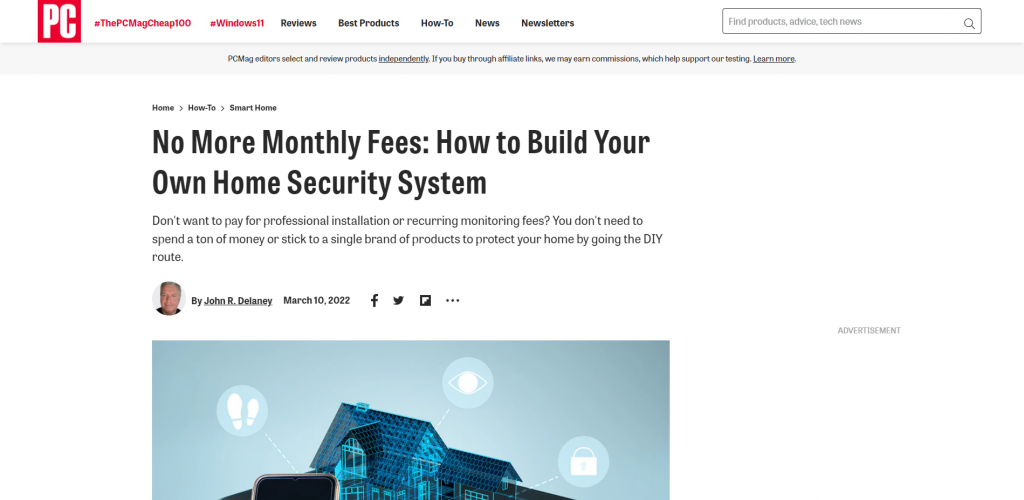Is Affiliate Marketing Worth It? 5 Reasons & How to Nail it
There are just so many myths and opinions (both negative and positive) about affiliate marketing out there on the internet that it is hard to figure out if it is worth it for you to get into it.
But hey, we’re here to guide you. This article will help you get a more in-depth understanding of this marketing method, understand if getting into affiliate marketing is worth the effort, and learn about its best practices.
What’s Affiliate Marketing?
Affiliate marketing is a strategy of advertising or promoting the products and services of a company in exchange for commissions. You can read more about it in our guide.
In order to understand affiliate marketing, we first need to figure out who is involved in it. There are three types of players in the affiliate marketing sphere:
- Companies that have a product or service. They create affiliate programs where they set the rules, processes, and commission prices for anyone that wants to promote them.
- Affiliates. These are website owners, bloggers, and anyone who has some sort of traffic and wants to make money online from it. They participate in an affiliate program by promoting the goods of the companies mentioned above and get paid for it.
- Affiliate networks. Intermediate entities that connect companies with affiliates and earn commissions from that match. An example of an affiliate network is ClickBank, whose business model is to connect new affiliate offers with e-commerce entrepreneurs, retailers, small businesses, and marketplaces.
As a growth and monetization method, it still remains quite popular. Here’s what the affiliate marketing trend looks like, according to Google.

With a basic understanding of what affiliate marketing is, let’s move on to a more detailed breakdown and understand how it works.
How Does Affiliate Marketing Work?
The short answer is that affiliate marketers have blogs, YouTube channels, social media pages, etc., where they post content that speaks about the product they promote. Affiliates hope that their audience will see the product on their page, like it, and make a purchase.
But you came here for the long answer, right? Then let’s break down the process of affiliate marketing with a real-life example. For instance, ActiveCampaign is a marketing automation SaaS tool. To grow its customer base, the company prepared an affiliate program. Here’s a screenshot from the program page.

In this program, ActiveCampaign explains the rules and prices, which are:
- The brand pays you affiliate commissions when the lead you have attracted becomes a paid ActiveCampaign customer.
- The commission rate is 20% of the subscription fee. If the client you have brought pays $2,000 a month for an ActiveCampaign subscription, you get $400 each month, too.
- The commission can increase up to 30% if you bring many customers that stick around for a long time.
Sounds like a lucrative deal, right? But how can ActiveCampaign know that it was your lead that subscribed to a paid plan?
Affiliate links solve this problem. When registering for an affiliate program, you get a referral link with a unique ID. This is the link you place in your blog posts, YouTube video descriptions, etc.
When someone from your audience clicks on this link, they go to the ActiveCampaign page. ActiveCampaign detects your unique ID through it and places on record that this visitor came from your promotion. So, if the prospect buys a subscription, ActiveCampaign puts that under your name and starts sending you 20% commissions each month.
That’s pretty much it. Affiliate marketing is quite a straightforward process.
Now about the ways you earn money. The example above was about paying commissions from purchases. This model is also called the CPA (cost per acquisition). But there is also the PPC (pay per click) model when you earn commissions each time your audience clicks on the affiliate link.
The last point to understand about affiliate marketing is its legal aspect. The U.S. Federal Trade Commission (FTC) has regulations requiring all websites to disclose that their content includes a paid promotion. If you have a blog and want to add affiliate links to your posts, you need a disclaimer that explicitly states that there is an ad in your content.
Now you know how affiliate marketing works. But is it worth doing it? We will help you find the answer to this in our next section.
5 Reasons Why Affiliate Marketing Is Worth It
Affiliate marketing is a lucrative activity to get into. According to Statista, companies are expected to pay around $8.2 billion in 2022 to affiliate marketers to help them sell their services and goods.
But the market size and payouts are not the only reasons you should consider this type of online marketing. Here are a few more good ones to consider.
Reason #1: If done right, it’s an effective monetization strategy
As a YouTuber or blogger, if you want to monetize your audience, it might be hard to choose a strategy that will work the best for you.
Affiliate marketing is one of the easier and more effective approaches, and it is a great candidate to become your first monetization channel. It is easy as all you need to do is tweak your content slightly to fit the product ads and affiliate links organically. And, it is effective as the ad looks naturally in your content, thus helping you avoid the banner blindness issue.
Reason #2: You can have effective business growth with affiliate marketing
This one is about the businesses that create affiliate marketing programs and invite publishers and creators to help them sell their products.
With an affiliate program, you are essentially outsourcing part of your marketing to others for a fee. Here’s how you can benefit from it:
- If you are a small company, you might not have a marketing team that is large and experienced enough to do promotions as effectively as affiliates can. You might not have a full-time marketing specialist at all.
- Affiliate marketers usually have highly engaged audiences in specific niches. So if your product is relevant to the interests of these audiences, the chances are high that they will come to your site and make a purchase.
So, with affiliate marketing, you will have bloggers and content creators helping you target relevant prospects and creating promotional content for you. All you need to do is create an affiliate program, track links, and pay out commissions to the creators who have brought you, customers.
Reason #3: Affiliate marketing is scalable
If you have chosen affiliate marketing to convert your traffic to earnings, it will be relatively easy for you to scale it up.
You can drive traffic to your pages with affiliate links by:
- Investing in search engine optimization and targeting lots of keywords.
- Bringing in extra paid traffic with search ads, social media posts, ads, podcasts, and other sources.
You can also add affiliate links to more products in your posts. There are lots of companies with affiliate programs you can choose from. You also join an affiliate network and find relevant programs there.
However, be careful with the last option, as having too many links can hurt your reputation. You always want to make sure that your content is interesting, genuine, and does not artificially advertise a bunch of products.
Reason #4: No need to create and maintain a product
If you are confident that you can create engaging content that will help sell products to your audience, why get into the time and resource-consuming process of developing your own product?
With affiliate marketing, you jump right into the promotion phase with goods that other companies have already developed.
The other benefit of promoting others’ products is that you do not need to handle customer service and returns.
Both are critically important aspects of selling goods, and companies hire entire teams to cover these areas. As the products you market are not yours, you do not have to handle customers and returns. It is the business that sells the products that will take responsibility for them.
Reason #5: No initial capital needed
The final benefit of doing affiliate marketing is that there are no start-up costs.
If you are making quality content and your audience is engaged, then all you need to do is register for affiliate programs (they are free), get your links, organically add product promotion into your content, insert these affiliate links, and get commissions. That’s it.
Although you might need to invest in SEO and social/search advertising at some point to increase your traffic and, thus, affiliate revenue, you will not need to spend any money at the start.
To sum up, affiliate marketing is an interesting and effective approach to both monetize your website traffic and sell more of your products. There are many compelling reasons for businesses and publishers/creators to get into the affiliate marketing business.
But how can you get the most out of your affiliate activities? Let’s start with the businesses and share several best practices that will help you increase your sales revenue with an affiliate program.
5 Ways to Make Affiliate Marketing Worth it (For Businesses)
No matter if you are selling services or physical products as a business, you are always looking for new ways to increase your revenue.
Affiliate marketing is a great approach to help you with that. But, as with any marketing strategy, you need to do it right to get the best results. For this, we are sharing with you a list of valuable best practices to consider when starting working with affiliates.
1. Promote your best products
The affiliate marketing industry plays the game of quality, not quantity.
It works better if your affiliate program is set for:
- High-price products.
- Products with the best quality that deliver the most value to buyers.
- Both points above (best-case scenario).
And there is a rationale behind this. Publishers prefer not to flood their content with lots of affiliate links. Ideally, they will have a couple. So, in order to earn more money from these links, publishers will give preference to promoting expensive products, as their commission will be larger too.
On the quality side, it is hard for creators to promote an inferior product, as that type of promotion can also hurt their reputation. So they usually go for the affiliate programs that have the best products.
2. Work with affiliates who have a passion for your products
As affiliate marketers talk about your product in their content, the way they describe it is super important.
If you select affiliate marketers that have used your product in the past and loved it, you will end up with:
- A more detailed explanation of the benefits your goods have, as they have personally experienced them.
- A lot more positive tone and emotions in the content, as the person describing your product genuinely believes that it is the best.
Thus, your affiliate partners will not only promote your goods because you pay them but also because they honestly want to recommend them to their friends and audience.
3. Partner with affiliates who resonate with your target audience
If done right, affiliate marketing can help you reach highly relevant audiences with the needs and pains that your products can solve.
But in order to benefit from this level of audience targeting, you need to make sure that you are collaborating with the right affiliate marketers. Before starting the collaboration with a creator, check:
- If their audience is engaged and the followers trust the affiliate’s opinion.
- If the interests, needs, and pains of their audience correlate with the products you offer.
Generally, if you are new to affiliate marketing, it is better to start with niche influencers, as their audience has a higher chance of meeting these two criteria.
4. Be competitive with your commissions
If you decide to try the affiliate marketing approach to growing your business, you need to take into account that the market is well-saturated and competitive.
Around 80% of all businesses have some kind of affiliate program. So, if your offer has low commissions or unappealing terms, most affiliates will ignore it and go for other companies.
Thus, it is important to check what your competitors offer to affiliate marketers and either follow their example or give something better.
One good practice that can increase your competitiveness in the market is paying lifetime commissions, as in the ActiveCampaign program we discussed. Compared to the one-time payment option, this method is far more interesting for affiliate marketers, as they can build sustainable cash flow for themselves.
5. Optimize landing pages to increase conversion rate
Let’s not forget that your success does not rely only on how many visitors your affiliates can attract to your landing page. These visitors also need to navigate through the page and make a purchase.
Therefore, if the landing page is not optimized, your affiliate efforts could go to waste. Traffic will be coming to your page, but the conversion rate and the affiliate sales revenue will be low.
This is why it is essential to test your landing pages and ensure they are well optimized before handing their URL over to the affiliate marketers to promote.
To recap, affiliate marketing is a great way for businesses to grow their revenue, but there are crucial best practices that they need to follow to get the most out of their affiliate programs.
Now let’s look at the second group of players – the affiliate marketers and share our recommendations for them too.
7 Ways to Make Affiliate Marketing Worth it (For Affiliates)
For bloggers, creators, webmasters, and basically anyone with a traffic source or audience, affiliate marketing is a relatively low-effort way of earning passive income.
However, affiliate marketing is not about placing links all over your content and hoping that someone will click on them. As an affiliate marketer, there is much more that you need to consider.
But no worries, we got you covered. Here’s our list of seven best practices to consider as a beginner affiliate marketer.
1. Promote products you have an experience with
It is usually a great practice to start with promoting those goods that you have personally used.
There are two solid reasons why you should take this approach:
- You can talk about the product without researching customer reviews, as you have already developed your own opinion.
- Your opinion looks more authentic and ethical to your audience, as you are speaking about your experience with the product instead of just praising it.
Now let’s see what all of this looks like in real life.
There is a great example at Android Authority with their smartphone reviews.

Before writing anything, the Android Authority teammates use the smartphone for some time and take notes about what they have liked and disliked in it. The team starts writing the review only after experiencing the phone personally.
This “personal experience” gives significant credibility to their reviews and thus, increases the chances that readers will click on the affiliate link and purchase the phone.
2. Create engaging and valuable content to promote a product
When you are doing affiliate marketing, content is your main dealmaker and deal-breaker.
Before you even start thinking about placing affiliate links, you need to have content that people read and love. Engaging content increases your brand awareness, trust, and authority in the eyes of your audience, and you will end up with a much higher chance that your readers will click on your affiliate links since they like and trust you.
For example, PCMag.com’s guides are a nice illustration of affiliate marketing with helpful and engaging content.
The guide above explains how to make a home security system yourself and avoid paying for security services.
PCMag explains the process in detail, guiding readers on selecting security cameras, smart locks, sensors, and connecting everything together.
This article contains many “Amazon associates” affiliate links to cameras, locks, and more. But, as it explains that you can save lots of money by buying and building your own security system, you are likely to click on these affiliate links.
3. Learn the basics of affiliate marketing
Although affiliate marketing requires no funds to start, you will need to invest something else – your time and efforts. It is a knowledge-intensive activity, and your success depends on your experience and expertise in the field.
Therefore, you should start learning how affiliate marketing works and what practices, processes, and tools it has.
Mastering this strategy is relatively easy, as there are many courses and step-by-step guides you can find online (like this free one on Udemy). You can also benefit from joining affiliate marketing forums (e.g. , Facebook groups like Affiliate Niche Builders, and communities like STM Forum). Finally, you can consider asking an experienced professional to mentor and guide you.
4. Focus on growing your audience first
Some creators start affiliate marketing before they develop their audience and organic traffic. These types of affiliates rely on ad traffic, SEO, and social media.
But this approach is not sustainable, as people from these marketing channels are not as engaged with your content as a regular audience.
The best practice is to focus on building a permanent audience that follows you and reads your posts constantly. So, build a solid and sizable following base before attempting to monetize it.
5. Focus on growing your email list first
The audience rule in the previous best practice also applies if you want to monetize an email list.
Yes, email marketing is still alive and doing well. And yes, it is a poor practice to grow an email following for the sole reason of selling them affiliate products. You should consider having some kind of newsletter or digest that your subscribers will love to read.
When you understand that your email subscriber base is big enough and they are actively consuming your content, it is a good time to promote products with affiliate links in your emails.
6. Promote products that resonate with your audience
Relevance is a key factor in determining the effectiveness of ads. Affiliate marketers take pride in having one of the most relevant ways of presenting ads, as their product promotions organically blend into the content.
But to ensure a high level of relevance, you need to be selective towards the affiliate programs and the products they offer you to sell. Also, make sure that the product you promote matches the interests and needs of your audience.
To better illustrate our point, let’s look at shugemery, a YouTube channel for hiking and camping enthusiasts.

The screenshot above is from a video about the clothes and accessories that the channel’s host wears when hiking in winter. As we can see, shugemery has used the description section to place the affiliate links of all the clothes they showcase in the video.
As shugemery’s subscribers are campers or hikers, they will probably consider a winter camping trip and need specialized warm clothes for that.
7. Monitor and analyze the performance of your affiliate links
Our last advice to you is to track your affiliate links and see how well they are performing. Common affiliate marketing metrics to track include:
- The number of clicks on affiliate links.
- Link conversion rate.
- Cost per click.
- Earnings per click, etc.
With proper affiliate marketing statistics monitoring set up, you can quickly see which links or pieces of content are not performing as expected and optimize them.
To conclude, you can build a stable revenue stream by monetizing your traffic with affiliate marketing, but you need to make sure that your content is relevant and your audience needs the products you are advertising.
Now Over to You
So, is affiliate marketing worth it?
The answer is yes, but you need to do it right to get tangible results. And this answer is equally valid for both sides – content creators with a desire to monetize their traffic and businesses who want to “outsource” their sales and marketing to affiliates.
Whether you decide to include the affiliate approach in your marketing strategy or not, good luck with your digital marketing efforts!
There are so many more interesting guides, analyses, and comparisons in our blog. Go have a look!
Frequently Asked Questions (FAQs)
Q1. Is affiliate marketing actually profitable?
If you rely on organic traffic and do not plan to run paid ads, then there will be almost no affiliate marketing spend. It means that all the earnings from affiliate programs are pure profit for you.
Q2. Is becoming an affiliate worth it?
Yes. It is worth becoming an affiliate if you have an engaged audience and you have selected products that resonate with their needs.
Q3. Is affiliate marketing a good way to make money?
Successful affiliate marketers can earn anywhere between $20,000 – $150,000. Your earnings as an affiliate depend on your audience size, the products you are advertising, the effectiveness of your promotions, and many other factors.
Q4. Affiliate marketing vs. direct marketing: what’s the difference?
The main difference between affiliate marketing and direct marketing is that with affiliate marketing, your products’ ads are organically embedded into relevant content and are hard to differentiate from the content itself, while with direct marketing, the ads are distinct and visible to the readers.

Sona Kalantaryan is a senior digital marketer with a creative past. Big fan of high cinema and well-optimized landing pages. She authors guides by sharing the best practices and does it the right way!

